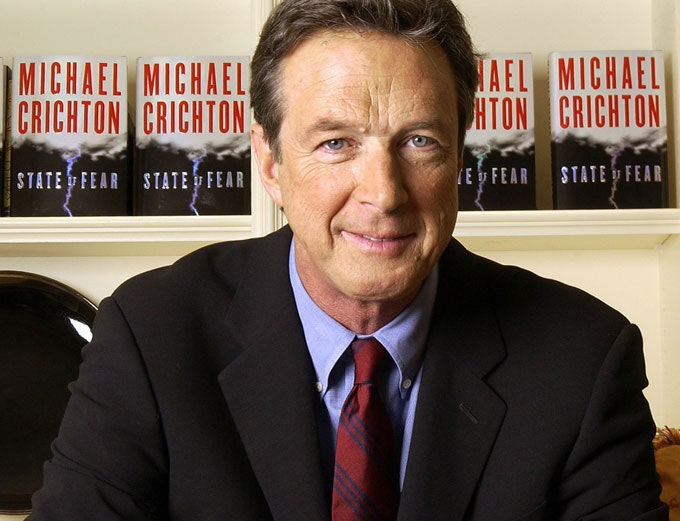While we do not consider that the complexity of a climate model makes it impossible to ever prove such a model false in any absolute sense, it does make the task of evaluation extremely difficult and leaves room for a subjective component of any assessment. — Michael Crichton
Michael Crichton (1942-2008) wrote 26 novels, many of which were made into movies such as Jurassic Park, Andromeda Strain, The Terminal Man, WestWorld and The Great Train Robbery. More people may know him as the creator and producer of the highly acclaimed TV series ER. He graduated Harvard Medical school in 1969 but never practiced medicine. Instead he used his medical and biology knowledge to create stories related to much of his training.
Crichton showed an early writing talent having published an article in the New York Times at age 14, so it was not surprising to his family that he chose to pursue this career. During it all he was a true advocate of REAL science untarnished by the politics that tends to guide it today. He exhibited this passion in a series of lectures from 2003 to 2005 and in his book “State of Fear” published in 2004 challenging the global warming fraud in a gripping fictional presentation.
This third in the series of articles at CFACT is drawn from his lecture on January 25, 2005 to the National Press Club in Washington, DC. Titled The Case for Skepticism on Global Warming. He opened his lecture by assuring his audience that he was as concerned about protecting our shared environment as anyone could be, but made it clear that basing our decisions on speculation not evidence was the wrong way to do it. It has resulted in the portion of views by public relations rather than scientific data. The result has been a politicization of most environmental issues. He said “data aren’t political”. He reminded the Press Club that on the first Earth Day in 1979 scientists at the University of California and else where were predicting the world would be 4 degrees cooler by 1990. Global cooling was the fear of the year and magazines featured ice age cartoons on their covers. He reminded everyone that it was all replaced by fear of warming within 5 years.
He then zeroed in on the growing scientific consensus and warned of the danger of consensus which are commonly wrong. Reminded the audience that in his your thoughts continents were not supposed to have moved. He quoted Mark Twain who said “whenever you find yourself on the side of the majority, it is time to pause and reflect.”
It was here that Crichton took off after climate models which nearly 20 years later remain the only basis for establishing economic policy about dealing with future climate predictions. Quoting entirely from that years International Panel on Climate Change Report number 3 he said:
“While we do not consider that the complexity of a climate model makes it impossible to ever prove such a model false in any absolute sense, it does make the task of evaluation extremely difficult and leaves room for a subjective component of any assessment”.
The term “subjective” should have set off alarms those 20 years ago as there is not room in science for being subjective. If you can not prove a theory false that theory has no possible validity. It is merely subjective. This is what he explained was the value of climate models. Little or none.
The long prediction of future climate states is not possible he said because we are dealing with a coupled, non linear chaotic system, the explanation of which may have been difficult for the Washington Press core to grasp. He then asked his audience, “if it can’t be predicted…….why are we worrying about the year 2100?.
He then posed to the audience the question, what if he is wrong. What if a major temperature rise is really going to happen. “Shouldn’t we act now and be safe? Don’t we have a responsibility to unborn generations to do so?”
He emphatically answered in the negative as to acting on behalf of folks 100 years from then as a result of our little or no knowledge of people and life so far into the future. To prove this conclusively he showed a slide of 78 words the audience all knew that day but Teddy Roosevelt would not have known in the year 1900. I will only list 20 here to make Crichton’s point. They include:
Airport. Fingerprints. Spot welding
Antibiotic. Jet stream. Prozac
Continental Drift. Radio wave Rollovers minutes
Zipper. Wind tunnel.
Nylon. Laser
Television. Gene therapy
You could easily come up with 20 more of your own in order to make the picture clear. Think how incredibly the world has changed in 100 years. Can we not safely assume it will change vastly more in the next century. Given these changes Crichton said “is there anything Teddy could have done in 1900 to help us? And aren’t we in his position right now with regard to 2100? “
He questioned at the end of his talk, spending trillions on the unknowable future in light of the miseries that remain throughout the world. He summed up in this final about where our focus should better be.
“What is wrong with us that we ignore this human misery and focus on events a hundred years from now? What must we do to awaken this phenomenally rich, spoiled and self-centered society to the issues of the wider world? The global crisis is not 100 years from now – it is right now. We should be addressing it. But we are not. Instead we cling to the reactionary and anti human doctrines of outdated environmentalism and turn our backs to the cries of the dying and the starving and the diseased of our shared world.”
Is this not wisdom that some of us could use to combat the evilness of the promoters of the green mantras.
